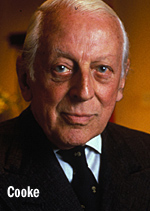Obituary: Alistair
Cooke, 95
Just five weeks after filing his last Letter from America for the BBC, Alistair Cooke died March 30 [2004] at his home in Manhattan. He was 95 and had heart disease.
Cooke had delivered the Letter for 58 years, far exceeding his 26 years as a U.S. correspondent for Britain's Guardian newspaper or the mere 22 years he hosted Masterpiece Theatre. For many of those years, Sundays was the big day for his fans. Letter aired in Britain on Sunday mornings and his Masterpiece in the United States on Sunday nights.
George Hall, an American broadcaster who listened to the 13-minute Letters via the BBC World Service, had dreaded the expected end of Cooke's long run. At right, Hall describes Cooke this way: "The most literate news writer in a century or two. Or ever."
Literate but chatty. "He wrote as one would speak, complete with sentence fragments and self-interruptions," observed William Safire in the New York Times. "But he also spoke as if he were writing . . ."
This was also Cooke's own view of his style, as he told Robert MacNeil on PBS: "I do write fast, but I talk to the paper, so that the syntax is all over the place as it is in talk. But if you do that, and people really believe you're thinking aloud, then it tends to be a good talk."
"He is usually very vivid, but you don't know where he's going," says Rebecca Eaton, executive producer of Masterpiece Theatre. "He will seem to go here and go there." Suddenly, his point emerges. "It's all very dramatic," she says.
Admirers said Cooke had bolstered the Atlantic alliance by helping the British and Americans understand one another over the years. But detractors thought Cooke had softened the reality of both countries. Cristina Odone, deputy editor of London's New Statesman, wrote: "Cooke botoxed his adopted land of its wrinkles — parochialism, racism, conformism" and merely tut-tutted at its ugly side.
Cooke came to love America during his studies at Yale in 1932, and after reviewing movies for the BBC he returned to the States to stay in 1937.
Before Masterpiece, Cooke hosted two major commercial TV programs that became models for future genres — Omnibus, a groundbreaking cultural magazine-format show that aired on each of the big three networks in turn between 1952 and 1961, and America, a BBC history of the United States aired before the U.S. bicentennial on NBC (and later on PBS).
His Masterpiece intros for PBS, aired between 1971 and 1992, made millions more fans of Cooke.
Eaton, e.p. of the series since 1985, says Cooke would come to Boston periodically to record batches of new segments. He'd stay in his usual hotel, type the intros and "outros" on his Royal manual, and read them to her over a glass of Scotch the night before taping, Eaton says. In the studio, he'd retreat to a corner to quietly memorize five minutes of script before taping each segment.
Cooke loved Upstairs Downstairs; Private Schulz, The Charmer and House of Cards, among other dramas he introduced, according to Eaton. "You would never know the ones he couldn't stand," she adds.
He stated his views more candidly in his journalism. But in his first Letter from America, a 1946 piece about queues for nylon stockings, excerpted this month by On the Media, Cooke is the same intent observer of humanity with the same crisp enunciation and roundabout construction of a tale.
Cooke is survived by his wife, Jane, a daughter, a son, a stepson and a stepdaughter. Readers wishing to make a donation in Cooke's memory may contribute to his favorite charity, National Camp for Blind Children, P.O. Box 6097, Lincoln, Neb. 68506-0097, according to Eaton.
On Alistair Cooke’s retirement
On Feb. 20, 2004, Alistair Cooke filed the last of his weekly Letter from America pieces for the BBC. He had been advised by his doctor to quit at the age of 95. George Hall, a retired American public broadcaster and lover of words, wrote the comment below in the form of a prompter script.
For the past dozen years or so
I have looked forward to each weekend.
While deeply dreading it
with a wince of foreboding.
Waiting to hear Alistair Cooke’s
Letter from America on the BBC.
Coming like the tides.
Regular as an atomic clock.
But knowing that nature was certain
to strike him down in the fullness of time.
Leaving us all bereft. And sadly vacant.
Oracle. Reporter. Raconteur.
Conscience. Expert. Historian.
Scold. And Muse at once.
The most literate news writer
in a century or two. Or ever.
British though and through.
Yet more American than Uncle Sam.
His voice purring. His manner polite.
His points sharp. His judgments drenching.
And so this weekend it inevitably came.
The awful announcement was read aloud.
Thank God he is still with us.
Overlooking Central Park.
But the grand series is brought to its end.
And where will I find my guidance now?
With my faithful Cicerone silent hence.
And utterly hereafter.
George Hall
Raleigh, North Carolina
15 March 2004
Web page posted April 12, 2004
Current
The newspaper about public TV and radio
in the United States
Current Publishing Committee, Takoma Park, Md.
Copyright 2004
